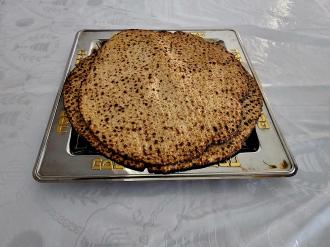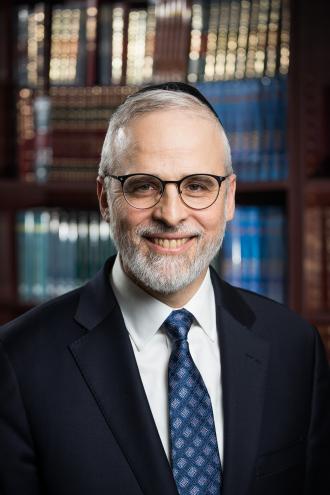Ask any bedouins, desert travelers, or third-world countries how much they would be
willing to pay for a rock that would provide unlimited water - and they will tell you that
such an item would revolutionize the world and would be literally priceless. It is for this
reason that, historically, cities were usually only built near sources of water or else the
city would not survive. Yet, the Jewish nation traveled throughout the desert for over 40
years without any hydration problem whatsoever. How? They had the Ba'er Mayim, an
incredible miraculous rock from which sprout enough water for the entire nation of
millions of people. In fact, the Midrash states that there was so much water that
emanated from the rock, that it created entire rivers.
In this week's parshah, the Torah reveals to us that this incredible miracle, which
provided life-sustaining water to every man, woman and child and supported them quite
comfortably, all came in the merit of one single incredible woman – Miriam. After she
was nifter, the water stopped completely.
Did Miriam, or anyone for that matter, have even the slightest inkling that the miraculous
water from the rock, which sustained the entire Jewish nation, was coming solely from
her merit?
R' Ephraim Shapiro relates the following true story regarding his father:
In 1951, Rabbi Mordechai Shapiro zt"l, then a young man, traveled to Eretz Yisroel and
found himself one day in Tel Aviv, on a main road on an erev Shabbos.
There, R' Shapiro saw the owner of a small shop that sold little odds & ends on the side
of the road. He noticed that the shop owner was learning the whole time between selling
things and he was impressed.
R' Shapiro decided to introduce himself to the shop owner and asked him his name.
"Yankel Oxenkrug", the owner replied. They made some small talk. Yankel Oxenkrug
asked the young R' Shapiro where he was from and where he learned. R' Shapiro
responded with pride that he learned in the world famous yeshiva in Lakewood under
Reb Ahron Kotler.
"Little Ahron Kotler?", Yankel said with curiosity in his voice. "I knew him back in Europe,
when he was a young little boy". "Un, vos hut ge'vorren fun em (what did he grow up
to become)"?
R' Shapiro told him that Reb Ahron grew up to become a Torah GIANT, the Gadol
Hador, who was one of the only people single-handedly rebuilding torah practice in
America in a truly impactful way*. When Yankel Oxenkrug heard this, he got emotional
and started crying tears of joy!
Yankel explained that as a young man, he was a butcher in Minsk. He had felt bad that
he didn't have time to learn, so for every pound of meat that he sold, he decided to put 1
small kopek into a large tzedaka jar. After a number of years, the jar was full, so he went
to the local yeshiva and asked the rebbi for the 2 biggest iluy-ish (brilliant) young boys,
and one of them was little Ahron Kotler. Yankel told the rebbi that he would like to pay
for these 2 boys to go to the best yeshiva in the world, which at that time was in
Slobodka, and so he gave the rebbi the money for them to be able to go. He never
really thought much about it after he had done so.
Now, years later, he couldn't believe the impact that those little kopeks had made.
Those kopeks that he had collected and donated, had helped "little Ahron" grow up to
become the giant and gadol hador, Reb Ahron Kotler.
The story does not end there. Decades later, Reb Yaakov Kamenetsky, an undisputed
Gadol Hador who was world-renown for his warm and pristine character, would come to
Florida for the winters and spend time in Rabbi Shapiro's home. One day, R' Shapiro
recounted this story to him. Reb Yaakov listened patiently and after it was concluded
said "da ma'aseh is takeh emes. Un ich bin g'ven da tzvaite bachur" - "The story is true.
I should know. I was that 2nd bachur". Little did that butcher know that his "small" actions
of collecting just a kopek a day and sponsoring the learning of 2 little boys, would merit
to impact Judaism in America and help shape the Torah world of America into what it is
today. Although he knew his actions were valuable, all this time he never knew what a
truly tremendous impact they were making on the world.
This story was relayed to me by my dear father.
There is virtually no source whatsoever, if any at all, that says that Miriam or anyone for
that matter knew that the Ba'er Mayim - the miraculous rock from which spout a
wellspring of life-sustaining water for every man, woman, and child of the entire Jewish
nation while they lived in the parched desert for over 40 years - was coming from and
due to solely Miriam's merit. She went her entire lifetime without being aware that her
merit impacted and sustained the entire Jewish nation in such a profound way.
Living Inspired
We all acknowledge twice a day in shema that our actions make a tremendous impact.
As we say in shema, if we follow the mitzvos, it literally shapes reality; our mitzvos bring
rain, food, and blessing to the world. May we all use the lesson from this week's
parshah, as well as the story relayed by R' Shapiro, to internalize this fact and live the
inspired life of someone who is motivated by the knowledge that, just because one does
not see the impact of their deeds, does not detract from the fact that they very well have
the potential to be truly miraculous and world changing, whether we see it or not. May
we utilize this inspiring reality to truly motivate ourselves to perform and value our torah
and mitzvos more and more, each and every day**.
Gut Shabbos
______
*- In 1943, R' Ahron Kotler founded Bais Medrash Gevoha in Lakewood, New Jersey,
with only 15 students. By the time of his death in 1962, the yeshiva had grown to 250
students. By 2019 the yeshiva had grown into the largest institution of its kind in
America with 6,715 students, 2,748 regular and 3,967 in Kollel. The surrounding
Lakewood community supports a network of more than 100 other yeshivas and
approximately 200 synagogues, with a frum population estimated at more than 100,000.
**- The mitzvos that make a large impact do not necessarily have to be ones that
appear to be monumental. What great actions did Miriam perform to earn the merit of
the Ba'er Mayim? In parshas Shemos the Torah calls Miriam "Puah", because of the
soothing noises she made to the Jewish babies in mitzrayim. Now, this may not seem
like such a significant act, yet it is the word that the Torah specifically uses to describe
this incredible tzadekes. Clearly, the Torah valued Miriam's "small" actions. Additionally,
the Torah states that she watched Moshe with genuine concern, as he floated down the
nile to see his fate - an act that earned her great merit. She also led the singing after
kri'as yam suf. These may not seem like monumental acts of greatness. Some of us
would merely categorize them as "minor" and as "insignificant" of an act as setting aside
a few kopeks to charity. Yet, look at what they accomplished!














